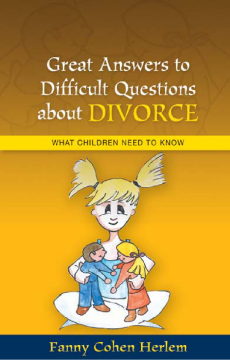
BOOK
Great Answers to Difficult Questions about Divorce
Fanny Cohen Herlem | Fanny Cohen Herlem
(2008)
Additional Information
Book Details
Abstract
Is it my fault that my parents are getting divorced?
Do I have to choose between my mum and my dad?
Is it normal to feel angry with my parents?
When faced with their parents' divorce, children have many concerns and questions that are difficult for a parent to answer. This book explores children's thoughts and feelings and provides parents with guidance on how to respond to difficult questions.
The author covers all the common questions that children ask and provides sensitive, candid answers in a way that children will be able to understand and relate to. Each chapter is devoted to a particular issue, such as why parents separate, what will happen during and after the divorce, and who the child is going to live with. The book recognizes the emotions and reactions of everyone in the family and includes separate conclusions for parents and children.
This handy guide offers useful advice for parents and will also be of interest to counsellors and other professionals working with children.
Common questions such as: Is it my fault that my parents are getting divorce? Do I have to choose between my mum and my dad? Is it normal to feel angry with my parents? are all covered in a sensitive and candid way that children will be able to understand and relate to. The book recognises the emotions and reactions of everyone in the family and includes separate conclusions for parents and children.
ChildRight
Fanny Cohen Herlem is a child psychiatrist and medical director of the adoption service, Doctors of the World. She has been helping children and their parents in her practice for the past 25 years.
Herlem provides two particularly useful resources, one for parents ("Messages that children should never be asked to carry") and a checklist for both children and parents which lists children's emotions and their emotional needs resulting from the uncertainty that has flooded their lives... This is a useful book which Educational and Child Psychologists could discuss with parents whose children are exhibiting the emotional and behavioural problems which commonly result from the separation or divorce.
Debate
Table of Contents
| Section Title | Page | Action | Price |
|---|---|---|---|
| Acknowledgments | |||
| 1. Introduction: opportunities and challenges for inclusive value chain development | |||
| Part 1: Context for value chain development | |||
| 2. Value chain development for poverty reduction: A reality check and a warning | |||
| 3. Maize diversity, market access and poverty reduction in the western highlands of Guatemala: Mountain development and research | |||
| 4. Stuck in a rut: Emerging cocoa cooperatives in Peru and factors that influence their performance | |||
| 5. What is cocoa sustainability? Mapping stakeholders’ socio-economic, environmental, and commercial constellations of priorities | |||
| 6. Development impact bonds: Learning from the Ashaninka cocoa and coffee case in Peru | |||
| Part 2: Design and implementation of VCD | |||
| 7. Fit for purpose? Review of tools for gender–equitable value chain development, 2018: Development in practice | |||
| 8. Building frontline market facilitators' capacity: The case of the ‘integrating very poor producers into value chains field guide' | |||
| 9. Value chain development in Nicaragua: Prevailing approaches and tools and persistent gaps | |||
| 10. Value chain development in Vietnam: A look at approaches used and options for improved impact | |||
| 11. Making markets work for women: How push and pull strategies can support women's economic empowerment | |||
| 12. Variation in smallholder strategies and capacities, and implications for effective targeting for value chain development | |||
| 13. Complexity in value chains and implications for businesses and development agencies | |||
| 14. Microfinance plus for ecosystem services: A territorial perspective on Proyecto CAMBio in Nicaragua | |||
| 15. Impact of an agricultural value chain project on smallholder farmers, households, and children in Liberia | |||
| 16. Practical lessons on scaling up smallholder-inclusive and sustainable cassava value chains in Africa | |||
| 17. Gender mainstreaming in value chain development: Experience with gender action learning system in Uganda |
